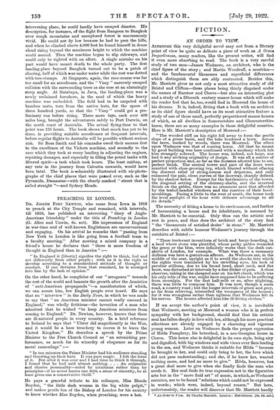PREACHING IN LONDON.
DR. JOSEPH FORT NEWTON, who came from Iowa in 1916 to preach at the City Temple and remained, with intervals, till 1919, has published an interesting " diary of Anglo- American friendship " under the title of Preaching in London
(G. Allen and Unwin, 6s. net). His impressions of England in war-time and of well-known Englishmen are unconventional and engaging. On his arrival he remarks that " passing from New York to London is like going from a football team to
a faculty meeting." After meeting a mixed company in a friend's house he declares that " there is more freedom of thought in England than in America " :- " In England it [liberty] signifies the right to think, feel and act differently from other people ; with us it is the right to develop according to a standardized attitude of thought or conduct. If one deviates from that standard, he is scourged into line by the lash of opinion."
On the other hand, he complains of our " arrogance " towards
the rest of the world and laments the growth after the Armistice of " anti-American propaganda "—a manifestation of which, we can assure him, few English people ever heard. He says that an " interview " in the Daily. News, in which he was made to say that " an American minister cannot really succeed in
England," was wholly fictitious—the invention of a man who admitted that he wished "to keep American ministers from coming to England." Dr. Newton, however, knows that there
are ill-natured people in every country. In a brief reference to Ireland he says that " Ulster did magnificently in the War, and it would be a base treachery to coerce it to leave the United Kingdom." He describes a speech by the Prime Minister to the Free Church Council as " an astonishing per- formance, as much for its wizardry of eloquence as for its moral camouflage" :— " In ten minutes the Prime Minister had his audience standing and throwing up their hats. It was pure magic. I felt the force of it. But after it was over and I had time to think it through, I found that be had said almost nothing. . . . An enigmatic and elusive personality—ruled by intuitions rather than by principles—if he never leaves one with a sense of sincerity, he at least gives one a conservative thrill."
He pays a graceful tribute to his colleague, Miss Maude Boyden, " the little dark woman in the big white pulpit," and makes gentle fun of the Bishop of London for his anxiety to know whether Miss Boyden, when preaching, wore a hat.


































 Previous page
Previous page